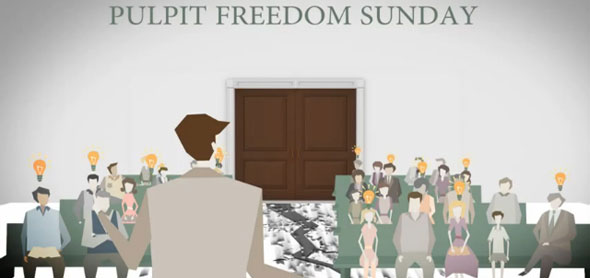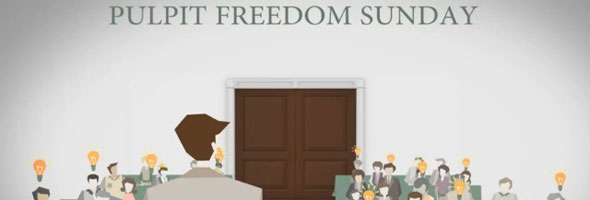
5 reasons why this pastor is against ‘pulpit freedom sunday’

ray rivera, pastor and founder of latino pastoral action center in the bronx, once told a story about a conversation he had with a midwestern pastor who insisted rivera was too political. so rivera asked, “pastor, tell me how your local schools are.” the pastor replied, “they’re top notch. some of the best in our state.” rivera continued, “tell me about your local hospitals.” “they’re excellent,” replied the pastor. “tell me about your libraries.” the pastor said, “our community is very proud of them.” rivera paused before responding, “pastor, in our community, our schools are failing, our hospitals are woefully behind and our libraries are full of hand-me-down books that are falling apart. because we love our neighbors, we’ve become their advocates for a better a community. if anything, we risk not being political enough.”
i use this story to illustrate that i believe, as does pastor rivera, the church has an appropriate place in the political sphere. by law, by tradition and by the pragmatics of ministry, there’s no barrier for the church to engage in what are commonly viewed as political issues.
but let me be very clear: aside from incredibly rare circumstances (hitler, etc), advocating a specific candidate in the name of jesus is always inappropriate. (trust me when i say that jesus doesn’t care whether obama or romney wins.) further, political agendas that aren’t fundamentally and primarily rooted in the values and mission of jesus are equally inappropriate.
so why offer this lengthy preface? because this story and the subsequent values help to shed some light on yesterday’s “pulpit freedom sunday”.
if you don’t know anything about this, take a few minutes here to familiarize yourself. in a nutshell, thousands (supposedly) pastors endorsed a presidential candidate from their pulpit yesterday in order to challenge the IRS to revoke their tax-exempt status (churches have a 501(c)(3) federal tax status which exempts them from paying taxes). it will be some time before we know if the IRS gives a flip about yesterday’s events (i sorta doubt it), but let me unequivocally state what i hope happens:
i hope each church that participated in “pulpit freedom sunday” loses their tax-exempt status.
with a statement so strong, let me offer a few reasons i’m compelled to hold this position.
1. tax-exempt status is a special privilege, not an innate right.
most people have no idea why churches are tax-exempt. it’s simple. the church has, historically, been one of the most positive forces of social aid in our country. few organizations have had and have the resources, values and organization needed to directly impact their immediate communities as the local church. the government realized that and created a tax privilege so that churches could do the most good. (whether or not the church actually does that is a whole other blog post just waiting to happen…)
so, pastor friends, the government has given you an extra special privilege that very few other organizations get (and that’s not even getting into the parsonage allowance specifically for pastors or special funding for faith-based orgs). if you feel like you don’t have free speech (which you do), you are more than welcome to give up your special government financial privilege. you are not required to be tax-exempt. want to endorse candidates? throw rousing political rallies? you have the right to do that. so long as you’re not doing it on the government’s dime (not to mention your community’s dime, which is the reason you’re getting the tax exemption).
2. this is another example of false persecution.
the right wing powers-that-be have spent the last decade creating a false narrative of christian persecution. in reality, that political machine has created a climate where evangelicals have unparalleled political power. the bush era was defined by a rise to power built largely on the backs of a conservative evangelical voting block. mitt romney now counts on that same base for any election hopes. so with my first point as a supporting argument, the government—rather than persecuting—actually caters to faith institutions in ways that very few other groups benefit from. christians simply cannot play the persecution card here in the united states.
3. this is a political power move for pastors.
one of the things i’ve spent years championing is flattened leadership which pursues the value of (to use christianese) the “priesthood of all believers”. it’s the idea that the pastor is a co-sojourner with the rest of the people in the church—not a powerful leader on a pedestal above others. he or she isn’t a CEO or a dictator or even the primary source of truth and knowledge within the local church body. “pulpit freedom sunday” puts forth as a value that the pastor’s political opinion is the foremost of the church. that if he or she makes a political stance from the pulpit, then it’s akin to the gospel truth.
it also further affirms that the people can’t otherwise think for themselves. see, as a pastor, my primary job isn’t to tell people the truth. rather, it’s to point people in the direction of the truth. i help to equip people to seek out the truth, to engage it, to question it, to struggle with it, to bat it around in the context of community. what pastors did yesterday was spoon feed a political perspective to their members, signaling that they’re unequipped to discern an opinion on their own. it presents a very shallow view of the relationship between politics and faith. which leads me to my next point…
4. it offers an incredibly shallow relationship between politics and faith.
much like bronx pastor ray rivera, over the last decade plus that i’ve led congregations, i’ve repeatedly talked about politics from the pulpit. but you would’ve never heard me endorse a candidate or even say i was speaking about politics. and it’s because i wasn’t, directly. i talked about jesus. i talked about the most central christian tenets like caring for the poor, loving the outcast, being in community with those on the fringes, practicing radical nonviolence, intensely valuing life and doing unto others as we would have them do to us. guess what? those things are intensely political.
you see, i can’t detach my most deeply held christian values when i’m weighing how i’m going to vote. i just can’t do it. i can’t vote for a candidate who has policies that neglect the poor. i can’t vote for someone who doesn’t protect life. i simply can’t rally behind a candidate who champions global violence. so when i teach about those things, i’m trusting that when people begin to make voting decisions, they’re living out those values in ways that don’t allow them, just like myself, to cast them aside. i regard the people i’m in community with highly enough that i don’t have to spoon feed them my political opinions. a high view of the relationship of politics and faith rejects “pulpit freedom sunday”.
5. let’s be honest what this is really about.
this isn’t really about free speech. this isn’t really about tax laws. this isn’t really about standing up for our faith.
this is about rallying the troops to vote against barack obama.
not even for mitt romney, but against barack obama.
as previously mentioned about evangelicals having unprecedented political power, this is about extending that power. it’s about endorsing a republican candidate. of course, the fascinating religion-related dynamic in this election is that evangelicals are now faced with a candidate who represents one of their quintessential relgious foes: a mormon. four years ago, the thought of ever voting for a mormon was viewed by conservative evangelicals just about the same as voting for jim jones or david koresh. but now they have barack obama to hate. to blame. to accuse of religious persecution. to lie about his own religion.
so yesterday, from their pulpits, rather than preaching about the good news of jesus, they preached against barack obama in favor of a mormon. while i don’t believe in a religious test for candidates—whether they be christian, mormon, muslim, atheist, etc—most of the leaders of these churches do. most wouldn’t vote for a muslim or an atheist. and until now, they wouldn’t have voted for a mormon. but they’re faced with something much worse: barack hussein obama. you know, the guy who, in a video released just last week, talked openly about being led by his pastor into a saving relationship with jesus christ? yeah, that guy. let’s just be honest what this whole thing is about.
so, time will tell if “pulpit freedom sunday” actually amounts to anything. i suspect it won’t, but you never know. i’m hoping the pastors get what they want, which is the IRS to revoke their tax-exempt status. of course, what they ultimately want is for this to go to the courts to be finally decided. and when it does, i’m really not sure which way it would go. what i do know, though, is when these pastors start protesting and giving interviews on fox news about how persecuted they are, it will only serve to continue to make the church look irrelevant and out-of-touch and useless. it will continue to drive people away—particularly young, bright, intelligent people who will struggle to see how the church is anything other than a political operative for a narrowing set of right wing principles. i certainly hope i’m wrong, but i believe that’s what lies ahead if these sorts of vaccuous displays of irrelevance continue from the church.
in the meantime, let us continue to preach jesus. to teach and live out justice and love and inclusivity. let us engage politics in ways that represent jesus to the world. i believe when we do that, we’ll experience a much more rich and full freedom in the pulpit that yesterday’s stunt could’ve ever generated.












